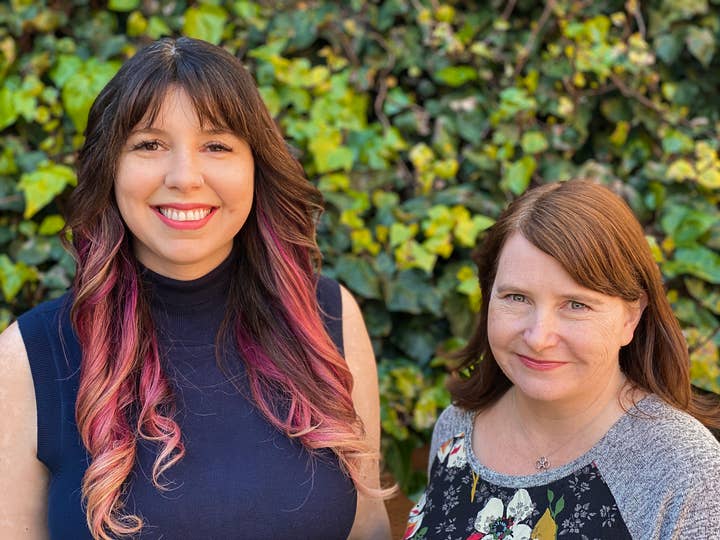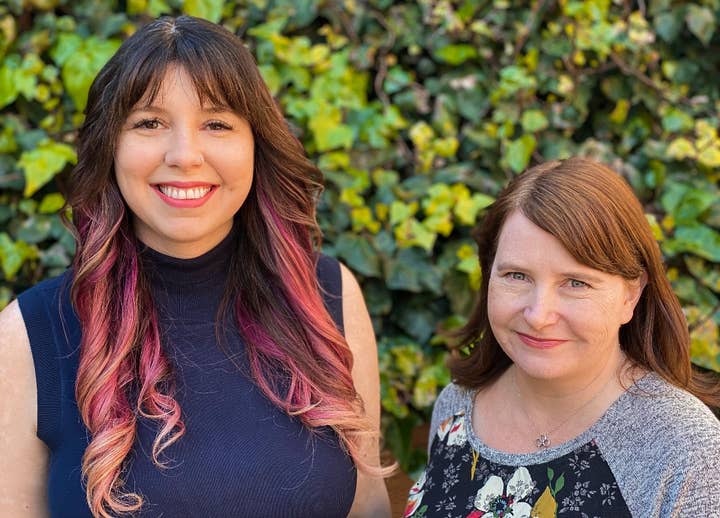Double Loop's plans for relaxing mobile games are far from "casual"
Founders Emily Greer and Shelby Moledina on making games into long-term hobbies, whether players identify as "gamers" or not
Though Emily Greer played games as a kid, she fell away for a period of time before she co-founded Kongregate with her brother Jim Greer. For a while, she was mostly only playing Bejeweled on her flip phone.
"I came back to games [with Kongregate] and it was great, but I also felt a fair amount of imposter syndrome for a long time because I still just loved 2D browser and mobile games and 3D often makes me sick," she says.
But then, something interesting happened. As she continued to work with Kongregate, the team there began joking about something called the "Emily Test" -- anything Greer played for more than five or six sessions during testing inevitably turned out to be a hit for the company.
"I realized that what felt like weakness was a strength -- that I represent the big mass market that's particularly on mobile of people who play games and may play games a lot, but don't think of themselves as gamers and don't fit into those stereotypes."
As Kongregate grew, Greer began to miss creating things with a smaller team. So in May 2019, she departed the company, took the summer off, and teamed up with WB Games veteran Shelby Moledina to form Double Loop Games as the CEO and COO, respectively. The pair announced the studio in February of this year alongside a $2.5 million funding round.
"What felt like weakness was a strength -- I represent the mass market of people who play games but don't think of themselves as gamers"
Emily Greer
Double Loop Games is focused on mobile titles that lie within the interests of its co-founders: games that can be played for relaxation, that are specifically targeted at adults who are working or have families and need to decompress after a long day. Greer and Moledina want these games to be attractive as long-term hobbies that players can return to day after day, for months or even years.
"I think that the things that are most meaningful long-term, whether they're games or physical hobbies, tend to be ones that also connect you with people, whether it's a community of strangers that you don't know or friends," Greer says. "If there's any part [of games] that's underserved, it's this part. And it's particularly underserved from a place of empathy, respect, and understanding."
The pair have complementary backgrounds in multiple respects. Greer describes herself as a more effective business lead, while Moledina is a talented creative leader. Both have grown up with games, both they also had experiences with gaming culture that led them to focus their work on an audience of players that they feel is underserved.
"It goes back to a stigma around games as valid things to do in our society, where people think it's childish," Greer says. "What feels like that very intense, core gamer identity is a rebellion against the idea that this is something you should be embarrassed about. It's a sort of ultra pride.

"But then that means that people like me are put off by two things. One is this very young, male, shooter-oriented core gamer that's what they see represented. And then also the feeling that this isn't really something I'm supposed to be doing. And yet I'm spending an hour a day on my favorite game, and it's filling this really important need in my life. So there's that reluctance."
Moledina describes a similar feeling. Though she started gaming with titles like King's Quest and The Secret of Monkey Island when she was a child, she lived in the country and wasn't initially aware of the ways in which her hobby was typically gendered by society. But as she got older, she began to experience social pushback.
"None of my friends growing up played games. Over the years, it became more and more normalized"
Shelby Moledina
"I knew I wanted to make games, but it still was something that I just couldn't really share with the people around me," she says. "None of my friends growing up played games. Over the years, it became more and more normalized. Clearly I have no negative feelings about talking about playing games or making games now, but that was a really long journey over the last 20 years to get to that point, because there always was a little bit of hesitancy around it, even though it's something that I truly loved.
"I also had a little bit of imposter syndrome in that I don't play shooters, and there is that specific thing that is really tied up with that word 'gamer'. I'm not into first-person shooters, but I am into some other pretty core games like turn-based RPGs. And a lot of the AAA games, I really love them. But that identity has become a limiter and a badge more than a true descriptor of what you're talking about, which is a person who plays games, which is actually a lot of people."
To reach that audience, Greer says that the natural way to describe what Double Loop is making is "casual" games. But she also thinks that word misrepresents what they are making and the habits of the audience it is for.
"If you're playing an hour on average per day or six hours a week, that's not casual"
Emily Greer
"If you're playing an hour on average per day or six hours a week, that's not casual," Greer says. "It's a barrier to fully understanding how people are playing and what they need and what they want.
"But I also really don't love the word 'core', because if something's core, then everything else is peripheral. And I don't think the mobile experience, free-to-play games, any of this, the largest [part of the gaming audience is] peripheral. They're just as important and deserve people starting studios and making games out of love and respect for the audience."
Greer and Moledina are preparing to enter a packed mobile market, where discovery is already a major problem. While Greer is confident her experience at Kongregate will help the team acquire users, she also notes that Double Loop may need to explore less traditional avenues to find its audience.
"You do have to make something that's distinctive and connects emotionally with the audience," she says. "And then have the capital and know-how to really do marketing, because one of the harder things with this audience is that they are not looking for games in the same way [as other gaming audiences]. They're not on Discord and Reddit looking for the next new thing, so you have to work harder to go out and find them and connect to them. But because they weren't looking for another game, once you've found them, they can be really, really loyal."
"We work hard, we're focused, we communicate, but I need to leave at a certain time to go pick up my child"
Shelby Moledina
Another major issue mobile studios must confront is monetization. Moledina says that Double Loop wants to take a balanced approach, avoiding predatory practices both because it's the right thing to do and because aggressive monetization harms games in the long-run. Though Double Loop hasn't announced any titles yet, Moledina suggests the team is exploring multiple revenue options, including in-game purchases and optional ads to let players progress. And she's especially interested in subscription services, because they are a high value offering both to players and to the studio, offering a consistent revenue stream that doesn't depend on individuals spending thousands.
And then there's the studio itself. Greer says that Double Loop wants to focus on sustainable development in several ways. One of those is a focus on games that can be iterated on and maintained long-term, allowing the team to be flexible with its goals for updates rather than crunching to release date after release date. Another revolves around how the team is structured.
"We are going a mostly remote and distributed team, which has a lot more flexibility," Greer says. "We also really want to be family-friendly and understanding of what happens when there's a global pandemic and your childcare falls through. We understand that as you get older, you both have more experience and more wisdom, and also more things going on in your life and we can trust and respect our employees to work around those in a way that is good for them and good for the company."
Moledina adds: "That has to be modeled from the top, starting with Emily and me and with the leaders that we've hired for the team. I think if you are working on a team and the founders don't have kids and don't have family concerns and they're working 24/7, then that trickles down to the team.
"What we're modeling is: we work hard, we're focused, we communicate, but I need to leave at a certain time to go pick up my child. That's fine, and we're modeling those sorts of healthy behaviors for the team. We're only bringing people on board who are also on board with those values, and who want to respect people's time and respect our team members."
Greer concludes: "And we think that makes for better games. Lots of the ideas that are going into our games are being pulled from the other things that we do with our lives. And if your only references are games, then it's harder to connect to a broader audience. We can bring in a lot more because we do a lot of things, and I think that balance is really positive and healthy for everybody."

